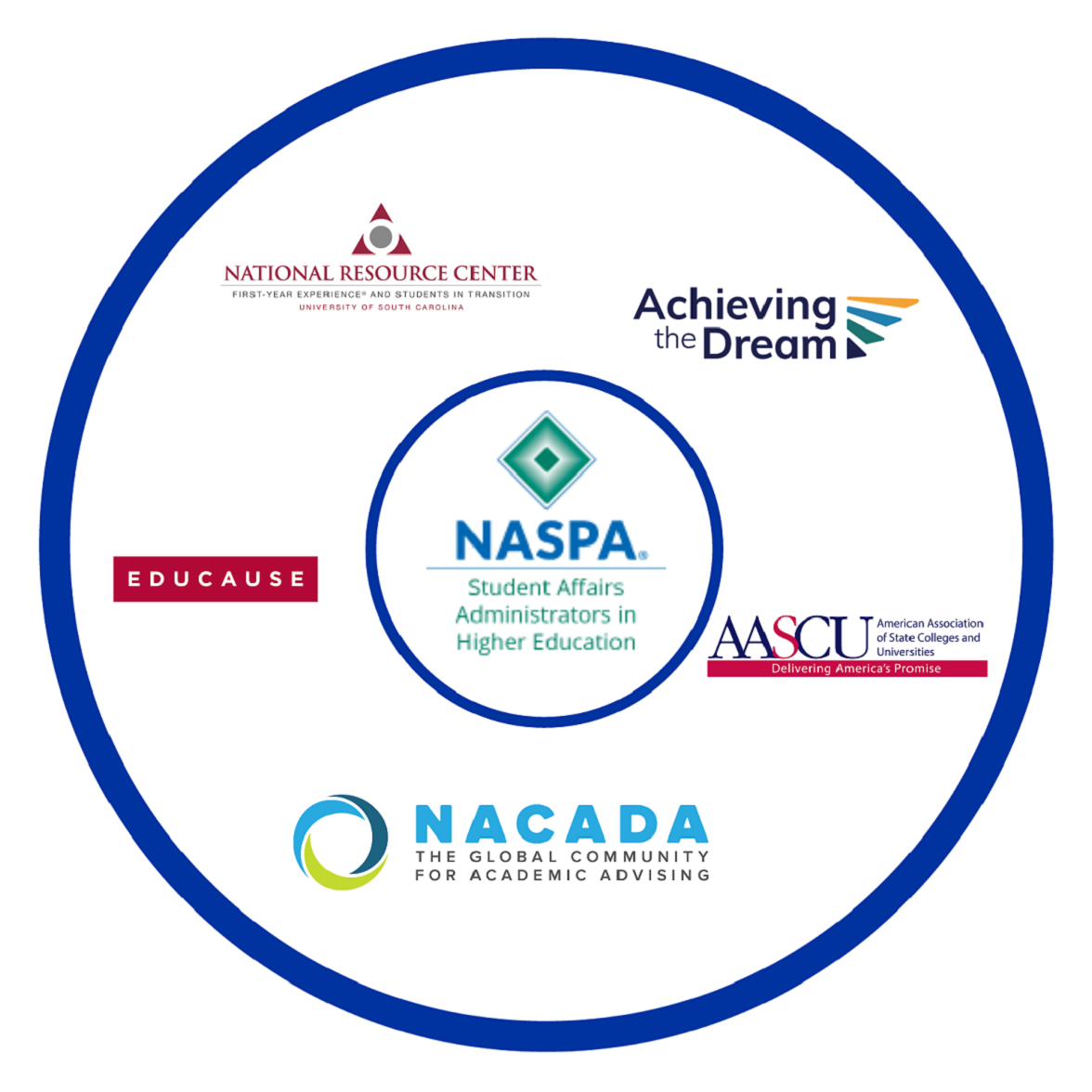Mission
Our mission is to bring together students, faculty, advisors and other student support staff to build cultures of care that support students in achieving their personal, academic, and career goals. We celebrate and amplify the work of institutions and individuals who successfully support Black, Latinx/a/o, Indigenous, Asian, Pacific Islander students and poverty-affected students and support the field in reflecting on and addressing institutionally-imposed barriers to student success by providing access to national experts and identity-conscious resources and services.
Vision
Our vision is a higher education landscape where institutions align to provide holistic support to students that is sustained, strategic, integrated, proactive, and personalized and take the whole student – their goals, intersectional identities, and experiences – into account.

Network Equity Focus
The Advising Success Network (ASN) embeds racial and socioeconomic equity in its approach by centering the lived experiences, talents, and aspirations of students from poverty-affected backgrounds, as well as Black, Latinx/a/o, Indigenous, Asian, and Pacific Islander students.
The network seeks to raise institutional awareness of racial and socioeconomic equity in student outcomes, focusing on how the institution designs systems, policies, and processes to either build healthy inclusive cultures or perpetuate systemic inequities.
Equity in fulfilling our mission
The pursuit of equity is fundamental to the ASN’s mission. A key focus of the network is to ensure historically under-represented students receive sustained, strategic, integrated, proactive, and personalized support through holistic advising and other student services. Network assets and services must therefore start by aligning stakeholders at any given institution on a shared vision for success, including metrics and institutional equity goals and anticipated outcomes. Institutional context informs existing policies and practices, as well as individuals’ understanding of equity goals. Whereas some institutions may articulate equity goals of serving a sub-population of students, others primarily serve racially minoritized students.
The network will also work with institutions on dismantling racist and classist hiring processes, work flows, policies and structures, to focus on quantitative outcomes and qualitative understandings of students’ experiences, to disaggregate data to the finest possible point to humanize all student populations and more responsibly identify inequities, and to ethically setup and use analytics technologies.
Equity in our network partners
Each network core partner organization has an expressed commitment to equity. As part of the quality assurance and professional development plans for network partners, the ASN and members will consistently check biases, seek input on contradictions, hold themselves accountable, and strengthen their skills. The ASN will critically analyze and aim to continuously improve systems, structures, cultures, policies, and processes within partner organizations and network activities, as well as through service design and delivery. Professional development will be provided on a continuous basis to bring awareness to our own biases, enhance our cultural competency, and inform our work.

Network Partners
NASPA – Student Affairs Administrators in Higher Education (NASPA) is the leading association for the advancement of the student affairs profession. Within the Advising Success Network, NASPA is well-positioned at the intersection of student and academic affairs to play the role of convener, thereby ensuring collaboration between partners, quality of technical assistance, and alignment with the guiding principles of the network.
The ASN has a deep understanding of the interconnection between advising, broader institutional goals, and student success. As thought leaders and experts in the field of holistic advising, we are able to provide resources on best practices in the field of advising as well as change management services to the institution more broadly. We believe this will result in new and reviewed structures and systems for advising that were designed to address racial and socioeconomic inequities and contribute positively to institutional goals and student outcomes.
We recognize that there is a large amount of variance in organizational structures, advising models, and student needs among higher education institutions. We, therefore, begin each engagement by aligning on a shared vision of student success, reviewing existing advising processes, policies and structures, including metrics (e.g. equity..) and always with the joint goal of creating more equitable experiences and outcomes for Black, Latinx/a/o, Indigenous, Asian, and Pacific Islander students and poverty-affected students.
NASPA’s core partners are dedicated to the advancement of the field of holistic advising. Leveraging their collective expertise and existing research and resources, they are well-positioned to provide effective solutions and materials across higher education.
ASN Definitions
- Advising
-
Advising is a critical component of student success, and a “bright star” in the integrated constellation of student supports at an institution. The advisor-advisee relationship supports students as they identify and attain their academic, career, and personal goals.
The network defines “advising” as encompassing more than the student interaction, to also include the structure and operations of academic advising; the roles and responsibilities of primary-role and faculty advisors; and advising pedagogies, approaches, and models.
- Advising Technologies
-
The network utilizes four core categories to describe academic technologies: 1) Academic Planning & Audit; 2) Caseload Management; 3) Diagnostic, Alerts, Signals, and Notifications; and 4) Performance Measurement & Management.
- Equity
-
A concept grounded in the principles of justice and “do no harm,” equity calls for both the acknowledgement of and commitment to rectifying historical injustices toward minoritized populations. In higher education, pursuing equity begins with institutions acknowledging that Whiteness is the norm and foundational to how the institution of higher education was created. Institutions pursuing equity articulate both their commitment to and actions in identifying, dismantling, and rebuilding the structures, systems, and cultures that uphold oppression and challenge minoritized students’ access to postsecondary opportunities and success.
Importantly, equity is not something institutions or practitioners achieve; rather, it is an ongoing process and commitment to ensure every individual has what they need to achieve their academic, career, and personal goals.
The Advising Success Network (ASN) defines racial and socioeconomic equity as centering the lived experiences, talents, and aspirations of Black, Latinx/a/o, Indigenous, Asian, Pacific Islander and poverty-affected students.
- Holistic Advising Redesign
-
Holistic advising redesign is a change management process focused on redesigning and aligning student supports to provide students with advising experiences that are sustained, strategic, integrated, proactive, and personalized (CCRC 2019).
This process impacts people, processes, and technologies, and requires centering student voice, and cross-functional collaboration across advising, leadership, Information Technology, Institutional Research, and other student support offices.
- Holistic Student Supports
-
The ASN views advising as a core component of institutional efforts to meet students where they are, address their individual needs, leverage their strengths, and focus on student development and learning.
Institutions successful in providing holistic student supports intentionally plan and integrate critical student support services into a seamless, timely, and personal experience for every student. Support services span advising, basic needs, mental health, career planning and services, tutoring, academic planning and support, and student financial health.
Adapted from: https://www.achievingthedream.org/resources/initiatives/holistic-student-supports.
- Institutional Transformation
-
Transformation creates inclusive and coherent learning environments to achieve equitable outcomes for students through catalytic leadership and evidence-based practices that are embedded in a continuous improvement process.
- Poverty-Affected
-
A student’s socioeconomic status is typically determined by individual and/or family income or wealth, level of educational attainment, and occupation (Northwestern University, Searle Center for Advancing Learning & Teaching, n.d.).
The network avoids using the following deficit-minded language to describe low-income students: economically disadvantaged, poor, students with challenges/issues, at-risk students, underprepared, disadvantaged, or underprivileged.
Instead, the network uses poverty-affected to describe students experiencing poverty.
- Racially Minoritized Students
-
This term replaces the term “minority students” and draws attention to the socially-constructed process by which groups are minoritized. When used in the context of higher education, the term “minority” can reflect an outdated assumption about who “traditional” college students are and can have harmful implications for how the field frames comparisons across student groups.
- Socioeconomic Status or Income
-
A student’s socioeconomic status is typically determined by individual and/or family income or wealth, level of educational attainment, and occupation (Northwestern University, Searle Center for Advancing Learning & Teaching, n.d.).
The network avoids using the following deficit-minded language to describe low-income students: economically disadvantaged, poor, students with challenges/issues, at-risk students, underprepared, disadvantaged, or underprivileged.
Instead, the network uses poverty-affected to describe students experiencing poverty.
- Student Success
-
Often defined from an institutional perspective, student success may include enrolling, retaining, and graduating students capped with securing post-college outcomes of employment or graduate school (at minimal cost and debt to the students and with maximum potential for earning).
From the student perspective, student success often looks like the outcome of a personal, rigorous, and enriching learning experience that culminates in the achievement of students’ academic goals in a timely manner and fully prepares them to realize their career aspirations.

